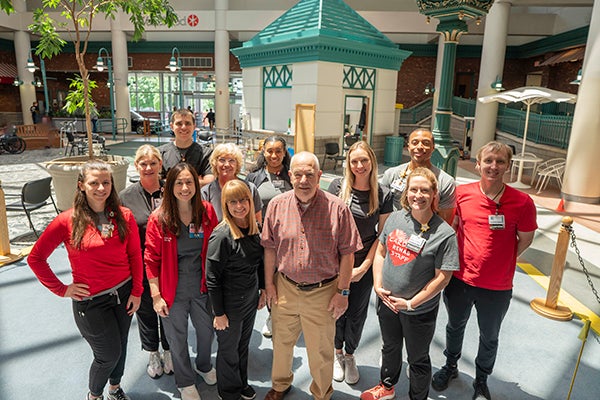A Heart to Heal: Navigating Drew's Long, Winding Road to Cardiac Recovery
June 2, 2025A Startling Diagnosis During a Routine Clearance
Drew's story began on July 14, 2023, when he visited his primary care doctor for knee surgery clearance.
"I had a bum knee. As part of the knee replacement preparation, the surgeon referred me for an evaluation of my organs, including my heart, because I couldn't undergo surgery if I had a bad heart. I wasn't worried about that since I felt fine."
One of the items on the checklist required an electrocardiogram (EKG). Despite being asymptomatic, Drew's doctor discovered atrial fibrillation (AFib). AFib refers to an abnormal heartbeat, also known as a type of arrhythmia, characterized by rapid and disorganized activity of the heart's upper chambers (atria). AFib can cause uneven heartbeat and may cause blood to accumulate in the heart, increasing the chances for blood clots, strokes and other issues.
"I was surprised to learn I was in AFib. I had no symptoms and felt quite healthy other than my knee."
His primary care provider prescribed temporary medication and referred Drew to Saleen Khan, MD, of WakeMed Heart & Vascular - Cardiology - Cary, whom he met with on August 7. She prescribed a new medication. Drew also took proactive measures to safeguard his health by purchasing a watch with an irregular rhythm notification feature for monitoring and detecting AFib.
Support for AFib through WakeMed Heart & Vascular
With the newly prescribed medication, Drew was out of AFib on August 13, and Dr. Khan started him on medications two times daily to help maintain his success. Unfortunately, he went back into AFib on August 20. During an appointment the following day, Drew underwent a cardioversion under the direction of Dr. Khan to restore his heart's rhythm. She also prescribed yet another medication to be taken three times daily. By late August, he was once again out of AFib. Dr. Khan then lowered his dose gradually from September 1 through September 8.
"I was very tired, lethargic and cognitively slow with brain fog. Dr. Khan steadily worked on my dosages to help me stay out of AFib but also to feel better in general."
Dr. Khan met with with Drew September 20 concerning medications and booked Drew for a computed tomography (CT) scan in mid October at WakeMed Raleigh Campus. Thereafter, Dr. Khan switched Drew to another medication and referred him for an ablation. A successful ablation could significantly reduce or possibly eliminate the need for medications.
A Referral to WakeMed Atrial Fibrillation Center
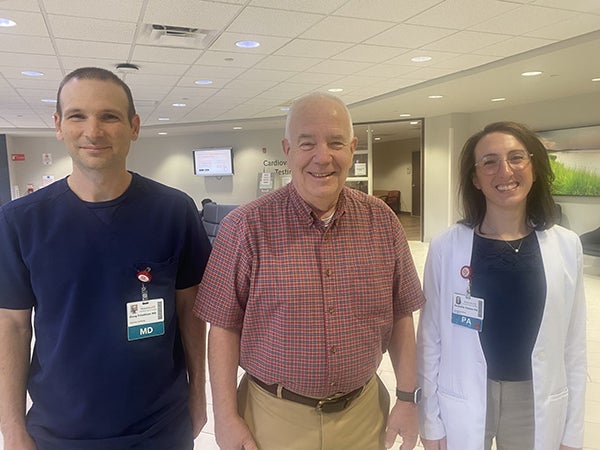
Drew went to the WakeMed Atrial Fibrillation Center and met with Ashish B. Patel, MD, MPH, FACC. His ablation was slated for December 22. Meanwhile, Drew's heart went back into AFib late in the evening on November 5.
"I tracked my AFib symptoms on my smart watch, and it alerted me when I was in AFib."
He took the medication Dr. Khan prescribed him for these incidents, but his AFib continued, so he took another pill that night. By the next morning, he was no longer in AFib. Drew alerted the WakeMed Atrial Fibrillation Center team of the incident, and he had a follow up with Michelle Deans, PA-C. She reviewed his medication regimen and performed an EKG.
A Sudden Loss of Vision
From mid-November through December 21, Drew completely ceased taking any medications.
"I thought the drugs made me feel terrible and mostly kept me on the couch."
To his dismay, on December 8, he lost partial vision in his left eye. Yet, he did not alert his doctors that this had occurred.
"I didn't know what was going on with my body. It seemed everything was falling apart, and I'm a private person, so I didn't want to share with anyone about the loss of vision, especially since I initially thought it was temporary."
In preparation for his ablation, Drew had a CT scan of his heart. He then underwent the ablation with Dr. Patel on December 22. The same day, he was discharged and prescribed medication to support his ablation in keeping him out of AFib. Gratefully, he did not receive any notifications via his smart watch of AFib activity following the ablation.
In January, Drew visited an ophthalmologist regarding the vision loss in his left eye. He was diagnosed with anterior ischemic optic neuropathy — a condition that occurs when there is a lack of blood flow to the vessels of the eye. It damages the optic nerve and presents with an increased risk among those with AFib.
Next Steps in AFib Treatment
Dr. Patel met with Drew in early February and paused his increased medication dosages since the ablation was showing positive impact.
Drew also continued care for the loss of vision in his eye, undergoing follow-up testing, including a brain magnetic resonance imaging (MRI) study, an EKG and vision exams. He also received a prescription for glasses.
Mid-April 2024, Drew met with Dr. Patel to see if the ablation was working. He'd not had another bout of AFib and was released to drink coffee and wine in moderation.
"It was so nice to have some of these small pleasures back."
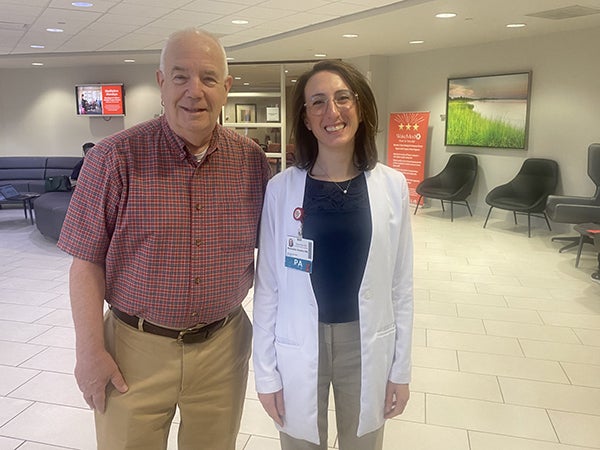
AFib Returns
Lamentably, on July 24, Drew's AFib returned. He was in AFib through mid August. On August 16, he was placed on a new medication regimen. He then met with Deans on August 19, where his medication was increased. The same day, his AFib stopped. She also scheduled an ablation with Dr. Patel for September 9.
In preparation for the ablation, Drew mentioned to Dr. Patel that he'd been dealing with shortness of breath and a lack of energy despite not being in AFib.
"I'd received a call from Dr. Patel, and I mentioned to him that I was happy not to be in AFib but had started developing other symptoms that wore me out. Dr. Patel was alarmed and shared that this was not normal. He referred me back to WakeMed cardiology."
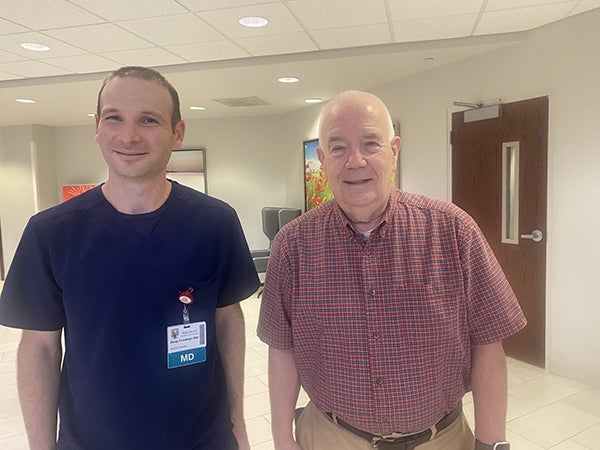
Drew's ablation was canceled to assess his new symptoms, and on September 12, he had an EKG with WakeMed cardiologist Douglas Friedman, MD, where he discussed symptoms of shortness of breath and a lack of energy. Dr. Friedman recommended that prior to another ablation, Drew should undergo a transesophageal echocardiogram (TEE). It uses ultrasound to create detailed pictures of the heart. The procedure involves placing a small ultrasound probe down the esophagus to get closer views of the heart's internal structures.
Discovery of a New Cardiac Issue
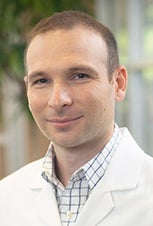 The TEE revealed a severe mitral valve leakage.
The TEE revealed a severe mitral valve leakage.
Dr. Friedman says, "Drew's symptoms could not all be explained by atrial fibrillation, and I suspected that a valve abnormality could be the primary cause of his symptoms and the reason for the return of his AFib. A TEE is the best way to further evaluate the valve to test this theory."
Drew was scheduled for a diagnostic cardiac catheterization in the WakeMed Heart Center invasive cardiology department for further testing of the heart and passages to and from his heart. This process would ensure the team could utilize a minimally invasive approach to address the leakage.
"I was so glad I'd mentioned that I was having these symptoms," comments Drew. "I didn't think much of it, but to learn that I had a severe leakage really put into perspective the importance of sharing my symptoms with my doctors."
On November 4, at the recommendation of cardiothoracic surgeon and surgical director of the WakeMed Structural Heart Program Bryon James Boulton, MD, FACS, Drew underwent a mitral valve repair, another ablation and an appendage repair, followed by around-the-clock care in the Cardiovascular Intensive Care Unit (CVICU). With his vitals stabilized and surgeries successful, Drew was discharged from the hospital five days later.
Drew explains, "Dr. Boulton went ahead and took care of three problems at once while in the operating room. I feel good now."
Dr. Friedman adds regarding Drew's six-month consultation, "We recently performed a follow-up echocardiogram. The great news is that Drew's heart strength is back to normal and the valve repair looks great."
Hope for Continued Healing in WakeMed Cardiac Rehab and Safeway to Fitness

From December 16, 2024, to April 14, 2025, Drew participated in the WakeMed Cardiac Rehab program.
He shares, "My rehab involved initial physical assessment, equipment review, expectations, goals, education sessions regarding eating habits, hydration, an hour of biking, weight training and stretching. Multiple therapists monitored and assisted me, including Patrick Kerr, Brice Howell, Carol Freeman, Carrie Wilkerson, Kara Williamson, Robyn Walter, Lisa Thompson, Trey Rouse and Evan Bukowinski. It was well run with plenty of support along the way."
Having successfully completed Cardiac Rehab, just two days later, Drew joined WakeMed Safeway to Fitness on April 16. He felt it would be a great way to connect with others in different stages of cardiac recovery and draw encouragement and strength from their journeys.
In considering his heart issues, Drew offers, "Overall, I feel better and am enjoying Safeway to Fitness with WakeMed fitness instructor Susie Davis. I still have some work to do to get back to where I want to be, but it’s not uncommon to take a year to fully recover. I'm still holding out on my knee surgery. I'd like to feel really healthy again before undergoing surgery."
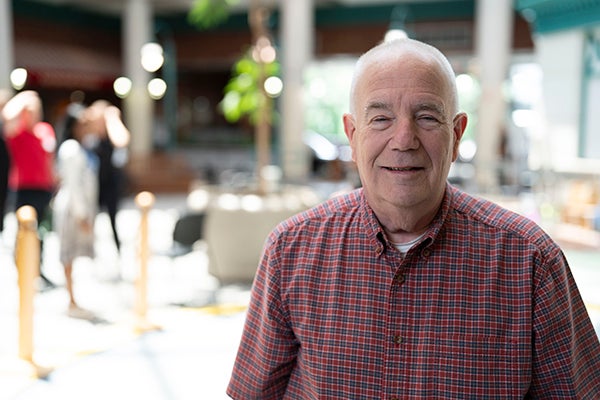
About WakeMed Cardiac Rehab
WakeMed Cardiac Rehab offers a safe, monitored environment where you can gain the strength, confidence, camaraderie and nutritional know-how you need to live a heart-healthy life.
The WakeMed Cardiac Rehab specialists welcome patients with these conditions:
- A recent heart attack
- Cardiac bypass surgery
- Angioplasty or stent placement
- Valve repair or replacement surgery
- A heart transplant
- Stable angina
- Heart failure
- Ventricular assist devices
About WakeMed Heart Center
When it comes to matters of the heart, there's nothing like experience. Wake County's first open heart surgery was performed at WakeMed in 1968, and we continue to be a leader in innovative cardiovascular care delivered by highly trained, board-certified physicians and staff who take a team approach to patient care. At WakeMed, patients always come first.
Whether it's having a cardiac intervention team ready and waiting for you in a time of emergency, managing your high cholesterol or high blood pressure levels or helping you regain strength with our dedicated cardiac rehab program, WakeMed’s Heart & Vascular services, physicians and staff are here for you.
About WakeMed Heart & Vascular
WakeMed Heart & Vascular brings together our team of expert cardiologists, surgeons, sub-specialists and advanced practice providers who are dedicated to putting patients first. Delivering the highest quality cardiovascular care, our physicians are where you need us in Raleigh, Cary, Apex, Benson, Clayton, Dunn, Fuquay-Varina, Garner, Wake Forest, and coming soon to Morrisville.
About WakeMed Imaging Services
WakeMed Imaging Services is a full-service imaging department offering advanced technology, convenient access and prompt testing and results. As professionals who have a true passion for care and caring, we focus on providing excellent, individualized service to each patient.
Services & Technology:
- CT scan
- 3D Breast Imaging and Breast MRI
- Bone Density — Available at Raleigh Radiology Locations
- Computed Axial Tomography (CT)
- Diagnostic Imaging or X-ray
- Diagnostic Injections & Pain Management
- Interventional Radiology
- Magnetic Resonance Imaging (MRI)
- Nuclear Medicine Testing, Treatment, Monitoring
- Special Imaging Services for Children
- Theranostics
- Ultrasound
- Vascular Interventional Radiology
About Safeway to Fitness
WakeMed Safeway to Fitness is a supervised group exercise program for adults who would like a structured, safe exercise experience. Graduates of a cardiac rehab program, people recovering from certain procedures and adults who just appreciate the security of knowing that a health professional is present are great candidates for Safeway to Fitness.
